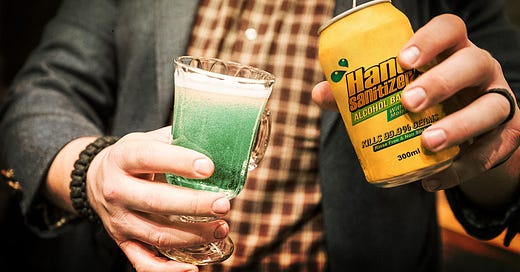How do we (still) talk to children about the coronavirus?
Third waves, new anxieties, and the longest-haul of long-hauls
On March 9th of this unending year, I wrote my second newsletter “How do we talk to children about the coronavirus?: Staying grounded in times of crisis.” Grounded! As if. Even though it would be days until the country shut down and we were hurtled into life as we have known it since, parents (myself included) were already overwhelmed by the whole thing. Articles like this started to pop up everywhere. But in the months since, we seem to have collectively moved on to advice about bribing your kids to exercise and turning closets into learning spaces.
Talking to our children about a potentially deadly and definitely disruptive virus was both harder and easier on March 9th than it is now. Harder because we knew so little, had no constructive options other than to give awkward elbow taps, and because, well, we’d never done it before. Easier because we benefited from the adrenaline that comes with a seemingly temporary crisis, because we still thought we were all in this together, because we knew it would be over by a date as ridiculously far-off as Christmas.
In March, my son had just turned four. He was not too concerned about what we called “the germs.” He seemed perfectly content to stay home and make Lego battleships, read Sylvester and the Magic Pebble with his grandma over Zoom, and be inaugurated, finally, into the world of entertainment streaming. Now, he is just weeks away from turning five. He has spent almost one-sixth of his lifetime in corona-times, during which he has learned how to ride a bike, write his name (for the most part, damn those tricky A’s), make a peanut butter and jelly sandwich (it’s not pretty, but I’ll take it), and tell you on which streaming platform any number of very boring and violent shows can be found.
Recently, he has started asking, maybe 25 times a day, maybe a million (it’s hard to tell where one day begins and another ends), whether he needs to wash his hands because of something he’s touched. “Do I have to wash my hands if I touch my ears?” “What if I scratch just the outside of my butt and then eat a yogurt tube? Is that bad?” The other night he called us into his room well after 10p.m., and halfway through a particularly tense episode of The Crown to ask, “If I touch my penis and then I put my finger up my nose, is that okay??”
After days of this, it suddenly occurred to me that we hadn’t had more than a passing conversation about the coronavirus in months. Sure we’d explained the hand-washing, the school being closed, the not-seeing-anyone. We talked about becoming “mask-wearing heroes” and what a playdate “with space” was. But that was months ago. We thought we were done explaining. But he is not the same person he was in March, and chances are, neither is your ten-year-old or sixteen-year-old or neither, even, are you.
We talked to him, and he was, as he put it “very question-y.” He wanted to know how people got it, what was safe and what wasn’t, if he would get it. It’s not just the changes in his little brain that have likely led to more questions. It’s the changes in our life, though on the surface it seems like nothing, nowhere, is changing, ever. It’s that this slog is coming up on its one-year anniversary, the disappointments are mounting and perhaps even escalating (like many others who dared to hope that some semblance of leadership would have at least kept things from getting worse, but now realize that that was a ridiculous idea, we have cancelled our plans to see family this holiday), and the restrictions are, in fact, increasing. Even though they can never find their shoes, kids see all. They know that things are not going well.
My point is, we’ve still got to talk to them about it. Even if it feels like it’s all we ever talk about. We’ve still got to check-in with our kids, even if they are processing it all day with people who are not us, and especially if, like my preschooler, they don’t really process it much because they are mostly pretending to be a cat all day. I’m not any better at it than I was nine months ago, but my thoughts on the matter still stand, and so I’m revisiting them for you, with a few additions that I wish the poor, innocent, March 2020 version of me had known (I also wish she’d known to get her roots touched-up…).
How do we still talk to kids about the Coronavirus?
Invite their questions. It can be awkward, but in times like these we owe it to kids not to brush over the details by saying “don’t worry about it” and instead to ask them what questions they have, no matter how silly or scary. Kids know by now that something is very wrong and that we are stressed about it, and when bad things happen and no one explains why, children can assume they are somehow to blame. You can start with a simple “what questions do you have?” and keep asking until they seem satisfied. If they can’t quite express themselves, you can try saying “some kids I know are wondering…” but try not to get too dark too fast unless you have clues that they are already there. In classrooms, you can do a K-W-L chart with students about the virus and help them sort through their collective questions and gather real answers.
Tell them the truth, but only the parts of the truth that they need. We don’t have to tell them that everything will be fine and there’s nothing to worry about, especially when our nonverbal messages are telling them otherwise (*and when we now know things are not fine and not totally in our control). We can be just as comforting by making true statements like “the adults in your life are doing things to protect you” or “our family is being very safe and that will help us stay healthy.” Whatever you say, try to be honest and to give just as much information as they seem to be asking for, not more.
Let them vent. There is an activity a friend taught me called “Spring Cleaning,” wherein one person gets to say all of the things that are scaring or bothering or angering them and the other person’s only role is to sit there, nod, and say “yes, what else?” Sometimes we like to put on a cheery face for the children, but we also have to acknowledge their complaints and frustrations so they know it’s okay to feel that way. Let everyone say all of the things they hate about COVID, shelter-in-place, hand-washing, masks, all of it. Don’t judge or respond. When it’s all out there, it’s a good time to say “It looks like we all get frustrated with this. Let’s talk about why we’re doing it and if there’s anything we can do to make some of it a tiny bit easier.” Doing this might reveal that your kid thinks their masks are itchy, that they hate the smell of some hand sanitizers, that they miss some random place or person you hadn’t thought twice about. Most things you can’t change, but there may be some wiggle room, for example, in finding a hand sanitizer that doesn’t smell like Jose Cuervo. You might also be surprised by what doesn’t upset your kids. This can be done in classrooms too as a whole group, which has the added benefit of kids seeing that they are not alone in how they feel.
Set intentions, even if you can’t make plans. A special shout out to all of the parents who have made what they thought was a very safe plan (say, a few days away with some family members to play Celebrity and watch all the John Wick movies in a row while someone else does bedtime, sigh…) and then had to tell their kids it wasn’t happening. I’m loathe to tell my kids about anything, for fear that even “Star Wars Hanukah Night” could be cancelled this year (not possible because it is just one night of Hanukah where my son has decided we will dress like our favorite Star Wars characters and watch Attack of the Clones, perhaps the worst of all 174 Star Wars films). But it’s important to have things to look forward to, whenever forward will be. Talk about where everyone wants to go on vacation, who people want to see, what new hobbies or activities people want to do when they can. Make those family dream boards. Don’t be afraid to say “as soon as we can do that safely, we will.”
Take care of yourself. I know, I know. I won’t condescend and tell you how crucial and doable it is to “put on your oxygen mask first” and all that because, well, it isn’t. This year has been more like what I imagine happens in a real plane crash - you go into emergency mode and forget everything that nice flight attendant said and absolutely put your kid’s oxygen mask on first and then quickly lose consciousness. But I will share the only helpful advice I’ve gotten on this front: not to overlook the little things. Challenge yourself to take a single breath before you walk in a room, take a hot shower every day, listen to one track on this playlist of songs written by the almighty Babyface while you hole yourself up in the bathroom. Toss the oxygen masks in the general direction of your family, sneak out the back door, and take a lap around the block.
What are your kids saying a million times a day lately?
Hi, I’m Sarah, an educational psychologist who had her own kids, realized most of the advice she’d been giving others was bullshit, and is now attempting to dismantle parenting expertise from the inside. Just think of me as the Clive Owen of the parenting industrial complex, but better looking. If you like this, please consider sharing and subscribing!











One of the hardest things this many months in is explaining differential behaviors by different families to my kids. We'll say something isn't safe and that's why we're not doing it, and then they'll hear that another family is getting to do that very same thing. It's confusing to them (and us!) and hard to explain that everyone is doing the best they can, but also not feel or convey some judgment about it all.
Thanks, I realized that I haven't sat my kids down to talk about the virus since literally March. At this point I think they're pretty unsure what value I'm adding at all to the family!
PS: what is K-W-L?